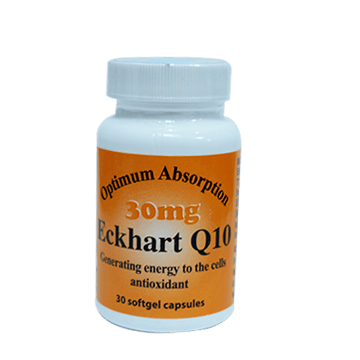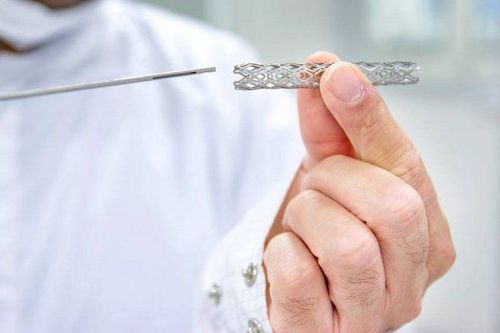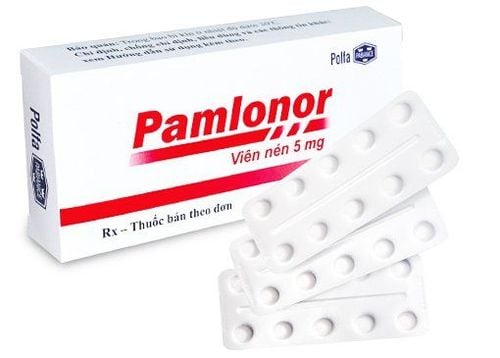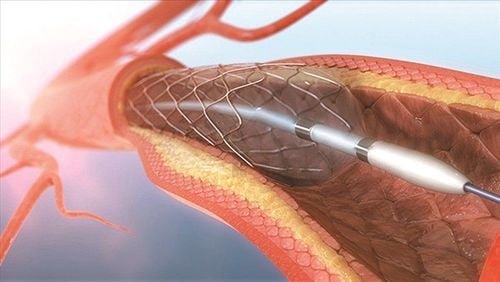This is an automatically translated article.
The article was professionally consulted by Dr. Do Xuan Chien - Department of Medical Examination and Internal Medicine, Vinmec Ha Long International General Hospital.Ischemic heart disease is one of the common cardiovascular diseases, most likely leading to myocardial infarction, causing myocardial necrosis, threatening the patient's life. According to Dr. Do Xuan Chien at Vinmec Ha Long Hospital, early awareness about myocardial ischemia helps patients and their families reduce their risk and contribute to effective treatment.
1. What is myocardial ischemia?
Myocardial ischemia (also known as myocardial ischemia) is a disease that occurs when blood flow to the heart is reduced, causing the heart to not receive enough oxygen needed for the contraction and ejection of the blood. Reduced blood flow to the heart is the result of a partial or complete blockage of the branches of a heart artery (coronary artery). Myocardial ischemia reduces the pumping ability of the heart, causing damage to the heart muscle, in many cases leading to arrhythmias and myocardial infarction. A sudden blockage of a coronary artery can cause a heart attack.Trắc nghiệm: Bạn có hiểu đúng về huyết áp cao không?
Huyết áp cao còn được gọi là kẻ giết người thầm lặng vì bệnh thường không có triệu chứng. Thiếu hụt kiến thức về huyết áp cao có thể làm cho tình trạng bệnh trở nên trầm trọng hơn. Dưới đây là những câu hỏi trắc nghiệm vui giúp bạn hiểu đúng về bệnh cao huyết áp.2. Expression of ischemic heart disease
Some patients with myocardial ischemia have no symptoms. However, when signs and symptoms do appear, the most common is pain in the chest area, usually the left side of the body (angina). In female, elderly, or diabetic patients, symptoms of ischemic heart disease may be more recognizable, including:
Neck or jaw pain. Shoulder or arm pain. Fast heart beat . Shortness of breath when exercising. Nausea and vomiting. Sweat a lot. Tired. Some patients may have other symptoms not mentioned above. If you have any questions about the symptoms and signs of ischemic heart disease, seek professional advice from the doctors at Vinmec.
3. Causes of ischemic heart disease
Myocardial ischemia occurs when blood flow through one or more of a patient's coronary arteries is impaired or obstructed. The main function of red blood cells in the blood is to transport oxygen to different parts of our body, including the heart. Because blood flow to the heart is reduced, the amount of oxygen supplied to the heart muscle is reduced.
3.1. Causes of myocardial ischemia Coronary artery disease (atherosclerosis): Atherosclerotic plaque is made up mainly of cholesterol, which accumulates on the artery walls, obstructing blood flow. Atherosclerosis is the most common cause of ischemic heart disease. Blood clots: Atherosclerotic plaques can rupture, creating a blood clot. This clot travels through the lumen of the blood vessel and causes embolism when it reaches the narrow passages, leading to sudden myocardial ischemia and the onset of myocardial infarction. Coronary artery spasm: The temporary constriction of the muscles of the coronary arteries impairs blood flow, even blocking the flow of blood to the heart muscle. However, coronary artery spasm is not a common cause of myocardial ischemia. 3.2. Initiating agents of angina In patients with ischemic heart disease, the following factors are more likely to trigger the onset of angina :
Exercise. Stress. Cold temperature. Use cocaine. 3.3. Risk factors for ischemic heart disease The following factors can increase the risk of ischemic heart disease:
Tobacco: One of the causes of hardening of the artery walls. Smoking also increases the risk of blood clots. Diabetes: This is a closely related disease that increases the risk of ischemic heart disease, myocardial infarction, and a variety of other heart problems. Hypertension: Over time, high blood pressure can lead to atherosclerosis, which damages the coronary arteries. High levels of cholesterol and triglycerides in the blood: Cholesterol and triglycerides are components that create atherosclerotic plaques. High levels of bad cholesterol in the blood can be caused by genetics or a diet high in saturated fat. Obesity: Being overweight or obese can lead to diabetes, high blood pressure and increase blood cholesterol levels. Sedentary lifestyle, inactivity: Lack of physical activity, lazy to exercise increases the risk of ischemic heart disease.
4. Treatment methods for ischemic heart disease
4.1. Lifestyle change

Don't smoke. Control related diseases: Such as diabetes, high blood pressure and dyslipidemia. Eat a healthy diet: Limit saturated fat, eat plenty of whole grains, fruits and vegetables. Exercise regularly and regularly. Maintain ideal weight: Some people always have trouble losing weight. Be honest with your doctor for instructions on how to lose weight properly. Reduce stress, reduce fatigue. 4.2. Drug use Some drugs and drug classes are often prescribed by doctors to treat myocardial ischemia, including:
Aspirin. The nitrate group. Beta blocker group. Calcium channel blocker group. Angiotensin-converting enzyme inhibitors (ACEi). Ranolazine (Ranexa). The use of the drug needs to follow the instructions of the doctor and adhere to the treatment to bring the highest effectiveness.
4.3. Surgery Sometimes, drug therapy is not optimal for patients with severe ischemic heart disease. In this case, surgery will be a more suitable choice:
Dilation and stenting: The doctor will insert a very thin catheter into the narrow part of the patient's artery. Next, a wire and a small balloon are inserted into the narrow area and inflated to widen the artery. A small wire mesh coil (called a stent) is inserted inside to keep the artery open. Coronary bypass surgery: This is a type of open heart surgery that uses a piece of blood vessel from another part of the body to create a graft, allowing blood to flow around the blocked coronary artery. . Modern mechanical treatment methods: These are new methods, applied when the condition becomes chronic, severe, other measures are not effective, the patient is not eligible for procedures. art.
5. Advantages when treating cardiovascular diseases at Vinmec
Since its inception, the Cardiovascular Center at Vinmec has built and developed with the orientation to become the leading Cardiovascular Center in Vietnam and the region. To realize this goal, Vinmec has equipped with the most advanced machinery system such as: CT 640 (Toshiba), MRI 3 Tesla machine (Siemens), high-end endoscopic equipment EVIS EXERA III (Olympus). Japan), Hybrid operating room according to international standards, Avace advanced anesthesia system,...
In addition, Vinmec's Cardiology Department always receives a lot of praise and satisfaction from domestic and international customers, being the pioneers in successfully applying the world's most advanced techniques in the treatment of diseases. cardiovascular theory.
A team of highly qualified and experienced specialists: qualified doctors from Master's to Professor's and Doctor's degrees, reputable in medical treatment, surgery, interventional cardiac catheterization. Intensive training at home & abroad. In particular, Prof. TS.BS Vo Thanh Nhan - Cardiology Director of Vinmec Central Park was recognized as the first and only expert in Vietnam to be awarded the "Proctor" certificate on TAVI. State-of-the-art equipment, comparable to major hospitals in the world: The most modern operating room in the world; The most modern silent magnetic resonance imaging machine in Southeast Asia; The CT machine has a super-fast scanning speed of only 0.275s/round without the use of drugs to lower the heart rate; 16-sequence PET/CT and SPECT/CT systems help to detect early damage to cardiovascular organs even when there are no symptoms of the disease. Application of the most advanced intensive cardiovascular techniques in the world in treatment: Painless open heart surgery; Percutaneous aortic intervention without general anesthesia; Treatment of mitral regurgitation through the catheter has a success rate of 95%; Ventricular-assisted artificial heart transplantation for patients with end-stage heart failure prolongs quality of life beyond 7 years. Cooperating with leading cardiovascular centers in Vietnam and the world such as: National Heart Institute, Cardiology Department of Hanoi Medical University, University of Paris Descartes - Georges Pompidou Hospital (France), University of Pennsylvania (France), University of Pennsylvania United States)... with the aim of updating the most modern cardiovascular treatments in the world.
Please dial HOTLINE for more information or register for an appointment HERE. Download MyVinmec app to make appointments faster and to manage your bookings easily.














